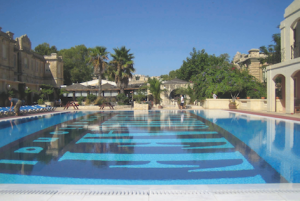“We would never have guessed that we would be so successful with something that we simply love to do,” relates Alberto Sarno, who with his brother Marcello started Sprachcaffe – now a global language teaching empire – as a way of financing their studies and inspired by the Italian tradition of the Caffe Letterario, political debate over coffee.
News and business analysis for Professionals in International Education
Have some pie!
The PIE profiles international education entrepreneurs
 David Brown and Robert Darell of ISIS Education, now a multi-million international operation, the company started life in a railway master's cupboard
David Brown and Robert Darell of ISIS Education, now a multi-million international operation, the company started life in a railway master's cupboard Thirty years later, the two Italian brothers head up an empire that is based out of Frankfurt, Germany, where their company began. Sprachcaffe teaches around 50,000 students, has 31 schools teaching seven languages – including the GEOS chain, acquired in 2011.
The Sarnos set up their business over a kitchen table, and many others have interesting start-up tales. Richard Brown is co-founder of award-winning BROWNS English Language School in Australia, established in 2004. He explains that he and his sister sought to flee finance and find an industry that they could feel passionate about, and it was a chance encounter with a language school on holiday that set the wheels in motion for them.
He reminisces: “BROWNS started with 4 students, 2 classrooms and a grand total teaching staff of 1. My sister [co-founder] appointed herself as the Office Manager and I was Activities Manager. Unfortunately however I was made redundant from this position for not being bringing the students back to class on-time from surfing lessons.”
Since then, the school has grown and gone on to build an impressive reputation and win a prestigious export award.
Others had a commitment to community-building, such as Paul Zysman, founder of Canada-based ILSC, which now teaches almost 10,000 students per year and has operations in four countries. Prior to start-up, with “sweat equity” as capital, he had worked in Africa training community organisers and found himself at the helm of a growing business that originally started with philanthropic aims.
“There was one classroom, with one teacher in it – me. There was one cleaner – me. There was one secretary – me. There was one marketing person – me.”
An original pioneer of the English language teaching industry, Frank Bell, who set up UK-based Bell Language Schools – now the Bell Educational Trust trading as Bell English – also had intercultural cohesion as his motivation for setting up a school in 1955.
Captured as a prisoner of war during the Second World War, in the harsh conditions of the camp, he taught his fellow prisoners Spanish and French, a simple act of defiance that quickly led to the creation of a secret university. After the war, Bell returned to England and, reflecting on his experiences, became convinced that the route to international co-operation and understanding lay in learning.
Quite often, too, motivation can be simply a belief that one can do it better. Cesar Rennert, founder of Rennert in the USA, explains, “I was inspired by how badly languages were taught at the university where I was teaching for many years. I just wanted to do it my own way.”
He continues – “It was very, very difficult. There was one classroom, with one teacher in it – me. There was one cleaner – me. There was one secretary – me. There was one marketing person – me.”
Johannes Kraus, German founder of Kurus English in Cape Town, was a disgruntled student who determined to blend language learning with experiencing Cape Town. “I had at times found it rather annoying to remain seated during somewhat lengthy communication classes, whilst just outside, and tantalisingly so, Cape Town was waiting with so many opportunities and experiences.”
One product of the state sector, and now arguably one of the most significant entrepreneurs in the industry, is another Antipodean, Rod Jones, now CEO of Navitas, which turns over AUS$702m and operates in 27 countries.
Jones explains that after running the secondary education authority for the Western Australian government and then helping set up institutions specifically for the international market, he realised that “there was a high failure rate amongst international students in the first stage of their studies, not through lack of academic ability but due to transitional and adjustment issues (new country and culture, different education system and language of instruction, homesickness).”
With a colleague, Dr Peter Larsen, he set up PIBT in Perth in 1994, on the campus of Edith Cowan University. It offered pre-university and university level programmes to both international and Australian students.
“There is an inevitability for language schools to move up the value chain into higher education for the international market”
PIBT evolved into Navitas, which now teaches 80,000 students a year and has three divisions, offering university prep programmes, professional training and a raft of various English programmes.
One of the other “big names” in the entrepreneurs enclosure, is Andrew Colin, who started out buying a private college also focusing on access to university, Bellerby’s College. He went on to develop language schools under the Embassy brand name, and in 1994 a company called British Study Group was formed that incorporated both businesses.
After selling to the Daily Mail group completely by 1999 for a documented UK£44 million, Colin then went on – after a spell in property – to set up INTO, working in tandem with university partners to set up on-campus foundation programmes that are jointly owned. INTO has since expanded its repertoire, offering Chinese language programmes in China, for example.
This company sold a 25% stake in its business to Leeds Equity Partners in December 2012 for UK£66 million.
As gaining a degree abroad became a much more marketable reality for students globally, many traditional language teaching businesses also eyed this leap up the food chain. Larry Finnegan, who operated general English and junior summer programmes along with his wife under the International House (IH) brand in Dublin, sold to Ireland’s Independent News and Media in 2011 because he could see the opportunities presented by running IH Dublin and INM’s private tertiary college, Independent College, under the same roof.
“In an era of global education it seems to me that there is an inevitability for language schools to move up the value chain into higher education for the international market,” he says. [more>]
Still looking? Find by category:




Fantastic article. It’s very comforting to see that so many successful organizations started out with nothing more than a passion and 80 hour work weeks!